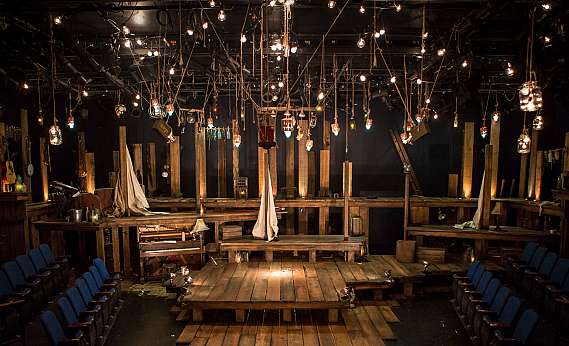From Michael Halberstam, Artistic Director

Pictured: Brianna Borger and Patrick Andrews. Photo by Saverio Truglia.
Here we are at the end of our first full season in our new home and we have a powerful piece of theatre to bring you as our grand finale. Parade tells the story of Leo Frank, accused of a murder he didn’t commit by an angry community who eventually decide to take the law into their own hands.
So, what on earth would compel the authors to turn this gut-wrenching story into a musical? And why produce it now?
“We must invest heavily in the soul of the nation by embracing empathy, compassion, and inclusive thought and feeling. ”
Firstly, I should focus on the obvious. The score is breathtaking. The unlikely subject matter pushes the boundaries of contemporary musical theatre and straddles the boundary between Broadway and the opera. The stakes are enormous and the score rises to the occasion. Cut from the same mold as Sondheim’s Sweeney Todd and Britten’s Peter Grimes, Parade walks a razor’s edge, separating the intimate and the epic and—as with those two iconic compositions—builds to a devastatingly personal climax.
Speaking of the personal, there is a story inside the story—the tale of Leo and Lucille. On the surface, they would seem to be a mismatched couple and yet, over the course of Leo’s wrongful imprisonment (at least according to Uhry and Brown), they come to know and trust each other, ending up at the center of a compelling and deeply moving love story.
The more epic narrative strikes at the heart of the state of our nation. What sent Leo Frank to his fate ultimately was prejudice—specifically anti-Semitism. As we yet again see intolerance of other cultures and racism overtly coming to light all around us (including a terrifying rise in anti-Semitism) it is vital that we examine the core values that have always given America such shining potential. Parade reminds us that, at the center of every horror story of unchecked bias resulting in violence, there are human beings who laugh when they are tickled and bleed when they are pricked. America is a nation of immigrants—some who came here willingly seeking a better life, some who came in chains, subjected to brutal degradation. We have fought two civil wars in order to right injustice. Our first was against tyranny from an unjust monarchy. Our second was to ensure the abolition of slavery. If we are to avoid a third, it seems to me that we must invest heavily in the soul of the nation by embracing empathy, compassion, and inclusive thought and feeling. We must also embrace art. I believe that art is the most compelling medium by which empathy and compassion can be communicated. This season has explored politics, racism, misogyny, gender and sexual identity and I hope it has been a useful point of meditation for you in helping to ask the right questions.
And now? On with the show.


No comments yet.